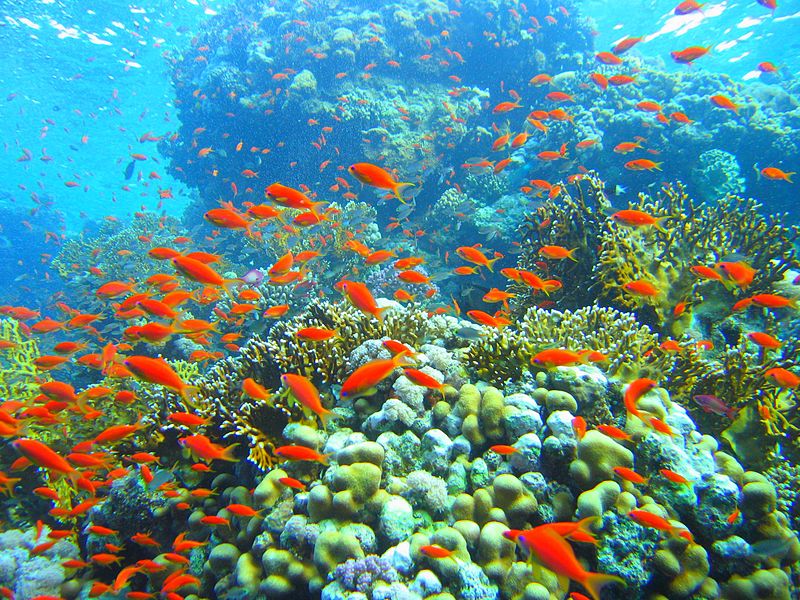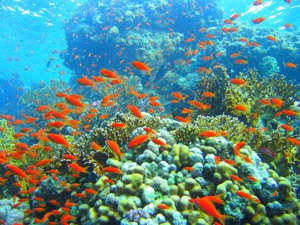Following the examples set by its bigger neighbours Grenada is in the process of restoring coral reefs which take the brunt of waves during stormy seasons. Apart from acting as a frontline barrier, coral reefs are also crucial elements on the Caribbean tourism thrives. Lately though, due to rising temperatures of the sea water as well as pollution, the health of coral reefs have taken a beating.
For a period of one month between September and October 2014, Grenada has identified several areas which are particularly vulnerable to climate and change and global warming. The Windward community located in the nearby island of Carriacou and Grand Anse located in Grenada have been identified as most vulnerable and in need of urgent protection.
“What we will be doing through this project is actually establishing coral nurseries and this is the first time it will be done in the Organisation of Eastern Caribbean States (OECS),” said Kerricia Hobson, the project manager in Grenada’s Ministry of Forestry, Agriculture, Fisheries and Lands.
“We will actually create coral nurseries where we will harvest live coral from some of the healthy colonies around the island. We will propagate them in the nursery and when they are sufficiently mature, we will plant them on existing reef structures.”
This project work of restoring the coral reef is a joint collaboration between the United Nations Environment Programme (UNEP) and the Government of Grenada.
A symposium was held on the 18th and 19th of June under the aegis of the Rally the Region to Action on Climate Change (RRAC) project, which is wholly funded by USAID.
Although the economy of the Caribbean Islands thrive on tourism derived from coastal eco-systems the destruction of the coral reefs cannot entirely be allocated under natural causes from global warming and climate change. As per Kerricia Hobson, there are a number of factors which have significantly contributed to the destruction of the coral reefs.
“A lot of them are climate-related but some of them are the result of human activities. In the Caribbean we have a history of not recognising the importance of some of these structures,” said Kerricia Hobson.
She went to explain that, “Like mangroves, with coral reefs some of the destruction is actually due to things like pollution which comes from land run-off. For example our agricultural sector, there is a tradition of farming close to water sources because it’s easier to get the water for your plants and your animals but it also means that when it rains all of the excess fertilizers and the faeces from your animals wash into the river and because we live on an island, five minutes after it rains these things end up on the reef. So what you end up having is a reef that is dominated by algae which overgrow the reefs.”
As per a report released from a three year old study by 90 International experts, the re-introduction and restoration of parrotfish populations, protection from over fishing, controlling coastal pollution and coastal management strategies can make coral reefs more resilient to future climate changes.
For example, in Belize, the coverage of live coral reefs in shallow patches have decreased from 80% in 1971 to 20% in 1996. In just three year, in 1999, its coverage further decreased to 13%. In the first instance, its decrease can be reconciled from the fact that in 1980, Hurricane Allen stormed into Jamaica and smashed the coral reefs. Further, globally, 75% of coral reefs suffer from habitat destruction, acidification of the seas, pollution and climate change.
In its 5th assessment report on climate change, the Inter-Govermental Panel on Climate Change (IPCC), stated that 20%-25% of the fish caught by developing nations is thanks to the existence of coral reefs, thus their loss and destruction, will negatively impact the livelihood of fishermen.
Further, IPCC’s report states that more than 100 countries reap the benefits from coral reefs from recreational activities. Apart from this, coral reefs protect the shoreline from storms and sea surges thus sheltering the only available habitable land for several island nations, thanks to coral reefs wetlands and mangroves can thrive. Coral reefs are essentially central to island nations and the rising sea levels along with their warming and acidification will majorly threaten the lives of coral reefs.
This has been made crystal clear to Caribbean nations, their very survival depends on them taking action now so as to thwart further degradation of existing ecosystems in and surrounding coral reefs.
“One is mitigation, which is really to limit the amount of greenhouse gases. We have to lobby all the major emitters because collectively all of the small island states really emit very little. We have to pursue a green economy,” said Dr. Dale Rankine, a researcher from the Caribbean Institute for Meteorology and Hydrology (CIMH).
He continued further saying, “Adaptation is also a major thing. For adaptation, we have to weigh the cost of action versus inaction right across the different sectors. Climate change is not an add-on. Some of the very things that are being advocated for climate change adaptation are the same things that we want to do for sustainable development. So it is not an add-on, it is really something that we can pursue whilst doing the same things but in a more sustainable manner,”
Dr. Rankine also suggested that countries need to start embedding climate change management strategies in their development program and diversify the agricultural sector. This is crucial “because some of the crops are just not going to survive in the future”.
References:
http://www.ipsnews.net/2015/06/grenada-rebuilds-barrier-reefs/
For a period of one month between September and October 2014, Grenada has identified several areas which are particularly vulnerable to climate and change and global warming. The Windward community located in the nearby island of Carriacou and Grand Anse located in Grenada have been identified as most vulnerable and in need of urgent protection.
“What we will be doing through this project is actually establishing coral nurseries and this is the first time it will be done in the Organisation of Eastern Caribbean States (OECS),” said Kerricia Hobson, the project manager in Grenada’s Ministry of Forestry, Agriculture, Fisheries and Lands.
“We will actually create coral nurseries where we will harvest live coral from some of the healthy colonies around the island. We will propagate them in the nursery and when they are sufficiently mature, we will plant them on existing reef structures.”
This project work of restoring the coral reef is a joint collaboration between the United Nations Environment Programme (UNEP) and the Government of Grenada.
A symposium was held on the 18th and 19th of June under the aegis of the Rally the Region to Action on Climate Change (RRAC) project, which is wholly funded by USAID.
Although the economy of the Caribbean Islands thrive on tourism derived from coastal eco-systems the destruction of the coral reefs cannot entirely be allocated under natural causes from global warming and climate change. As per Kerricia Hobson, there are a number of factors which have significantly contributed to the destruction of the coral reefs.
“A lot of them are climate-related but some of them are the result of human activities. In the Caribbean we have a history of not recognising the importance of some of these structures,” said Kerricia Hobson.
She went to explain that, “Like mangroves, with coral reefs some of the destruction is actually due to things like pollution which comes from land run-off. For example our agricultural sector, there is a tradition of farming close to water sources because it’s easier to get the water for your plants and your animals but it also means that when it rains all of the excess fertilizers and the faeces from your animals wash into the river and because we live on an island, five minutes after it rains these things end up on the reef. So what you end up having is a reef that is dominated by algae which overgrow the reefs.”
As per a report released from a three year old study by 90 International experts, the re-introduction and restoration of parrotfish populations, protection from over fishing, controlling coastal pollution and coastal management strategies can make coral reefs more resilient to future climate changes.
For example, in Belize, the coverage of live coral reefs in shallow patches have decreased from 80% in 1971 to 20% in 1996. In just three year, in 1999, its coverage further decreased to 13%. In the first instance, its decrease can be reconciled from the fact that in 1980, Hurricane Allen stormed into Jamaica and smashed the coral reefs. Further, globally, 75% of coral reefs suffer from habitat destruction, acidification of the seas, pollution and climate change.
In its 5th assessment report on climate change, the Inter-Govermental Panel on Climate Change (IPCC), stated that 20%-25% of the fish caught by developing nations is thanks to the existence of coral reefs, thus their loss and destruction, will negatively impact the livelihood of fishermen.
Further, IPCC’s report states that more than 100 countries reap the benefits from coral reefs from recreational activities. Apart from this, coral reefs protect the shoreline from storms and sea surges thus sheltering the only available habitable land for several island nations, thanks to coral reefs wetlands and mangroves can thrive. Coral reefs are essentially central to island nations and the rising sea levels along with their warming and acidification will majorly threaten the lives of coral reefs.
This has been made crystal clear to Caribbean nations, their very survival depends on them taking action now so as to thwart further degradation of existing ecosystems in and surrounding coral reefs.
“One is mitigation, which is really to limit the amount of greenhouse gases. We have to lobby all the major emitters because collectively all of the small island states really emit very little. We have to pursue a green economy,” said Dr. Dale Rankine, a researcher from the Caribbean Institute for Meteorology and Hydrology (CIMH).
He continued further saying, “Adaptation is also a major thing. For adaptation, we have to weigh the cost of action versus inaction right across the different sectors. Climate change is not an add-on. Some of the very things that are being advocated for climate change adaptation are the same things that we want to do for sustainable development. So it is not an add-on, it is really something that we can pursue whilst doing the same things but in a more sustainable manner,”
Dr. Rankine also suggested that countries need to start embedding climate change management strategies in their development program and diversify the agricultural sector. This is crucial “because some of the crops are just not going to survive in the future”.
References:
http://www.ipsnews.net/2015/06/grenada-rebuilds-barrier-reefs/


 Grenada takes pro-active steps and rebuilds coral reefs
Grenada takes pro-active steps and rebuilds coral reefs





 Companies
Companies